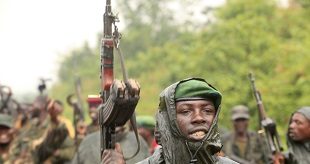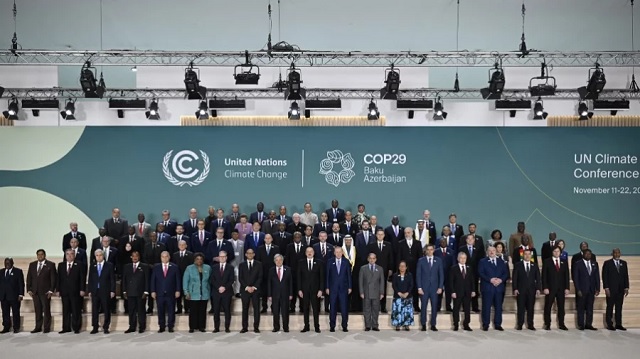
Global climate finance conference leaves bitter taste for Africa
ANALYSIS | RONALD MUSOKE | “When the world came to Baku, people doubted that Azerbaijan could deliver. They doubted that everyone could agree. They were wrong on both counts.”
Those were the parting shots of Mukhtar Babayev, the COP29 president, after a climate financing deal was finally struck in the wee hours of Nov.24.
Sounding relieved, Babayev added: “With this breakthrough, the Baku Finance Goal will turn billions (of dollars) into trillions over the next decade. We have secured a trebling of the core climate finance target for developing countries each year.”
Babayev said the “Baku Finance Goal” represents the best possible deal the negotiators could reach, and they had pushed the donor countries as far as possible.
“We have forever changed the global financial architecture and taken a significant step towards delivering the means to deliver a pathway to 1.5 ̊̊̊C. The years ahead will not be easy. The science shows that the challenges will only grow,” he said, adding that, “Our ability to work together will be tested. The Baku Breakthrough will help us weather the coming storms.”
Babayev’s sigh of relief followed 14 straight days of negotiations in Baku, the Azerbaijani capital. In fact, the two weeks appeared not enough as the negotiators only reached some sort of deal after “over time.” The conference should have ended on Nov.23.
According to the agreement, colloquially known as “the Baku Finance Goal (BFG),” there is a new commitment to mobilize and channel US$1.3 trillion of climate finance to the developing world per year by 2035. This, some experts say, represents a significant uplift from the previous climate finance goal of US$100 billion and will unlock a new wave of global investment.
It contains a core target for developed countries to take the lead in mobilising at least US$300 billion per year, starting in 2026. The new goal will replace the current annual target of US$100bn. The Baku Finance Goal also pays special consideration to support the least developed countries and small island developing states, with provisions on accessibility and transparency.
“It was hard fought over, but at US$300 billion per year, we have arrived at the boundary between what is politically achievable today in developed countries and what would make a difference in developing countries,” said Avinash Persaud, the Special Advisor on Climate Change to the President of the Inter-American Development Bank.
However, Persaud, who is a former Special Envoy to the Prime Minister of Barbados noted that the Baku deal will, however, only work if this money is primarily allocated to help vulnerable countries become more resilient to climate change.
Meanwhile, Babayev noted that the Baku Finance Goal was the result of months of intensive diplomacy by the Azerbaijani Presidency to deliver some of the most complex and controversial tasks in multilateral climate negotiations. For instance, COP29 ended the decade-long wait for the conclusion of “Article 6” negotiations on high integrity carbon markets under the UN.
As a result, financial flows from compliant carbon markets could reach US$1 trillion per year by 2050. They also have the potential to reduce the cost of implementing national climate plans by US$250 billion per year.
The COP29 Presidency also said it succeeded in getting the Fund for Loss and Damage up and running and ready to distribute money in 2025. Loss and damage, as defined by the United Nations, refers to the negative impacts of climate change that go beyond what people can adapt to or cope with.
It includes lives lost, monetary costs from the destruction of infrastructure, buildings, crops, other property, as well as the loss of entire geographical areas or people’s ways of life. The Baku decision was long awaited by developing countries, including small island states, least developed countries, and African nations.
Not everyone was impressed
Yet, despite the celebrations of success by the hosts, there were several dissenting voices from independent experts and representatives of African countries and other vulnerable regions. As momentum built ahead of COP29, some experts referred to the Baku climate summit as the “Finance COP.”
Ahead of COP29, multiple scientific studies showed that funding in the order of US$1 trillion per year in grants and low-interest loans would be needed to help low-income nations cut emissions, adapt to mounting climate impacts, and address loss and damage at home.
But as the summit drew to a close, thousands returned home dejected. This was more or less the case for negotiators coming from vulnerable countries which are already bearing the brunt of increasingly severe climate impacts.
Dr. Rachel Cleetus, the policy director and lead economist for the Climate and Energy Programme at the Union of Concerned Scientists, who has been attending the UN climate talks over the last 20 years was disappointed by the Baku COP29.
“The Azerbaijani COP29 Presidency’s ineptitude in brokering an agreement at this consequential climate finance COP will go down in ignominy,” she said. “The last ditch, highly insufficient agreement barely came together deep into overtime and its low amount, quality, and unambitious timeline raises significant concerns that future financial flows will fail to measure up to what’s needed.”
“Rich nations, including the United States and the European Union countries, have exercised brute power here at COP29 to force a deeply unfair and inadequate climate finance outcome that imperils the science-based goals of the Paris climate agreement,” she said.
Dr Cleetus noted that despite their starring role in causing the climate crisis, the “wealthy coalition of the unwilling” collectively offered a grossly insufficient US$300 billion annually by 2035, with a weak provision to review in five years and numerous loopholes to evade responsibility for ensuring the majority is grant-based public finance.
“This is nowhere near what lower income nations need to quickly transition away from fossil fuels to clean energy and protect people from the ravages of the climate crisis they’re already enduring,” she said.
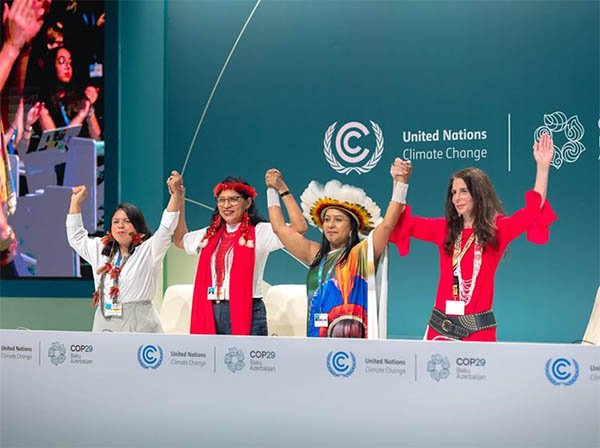
By reneging on their climate finance responsibility and continuing to boost fossil fuel interests, richer countries are stymying the world’s ability to cut heat-trapping emissions quickly and unjustly foisting the costs of deadly climate extremes onto those who have contributed the least to the problem, she said.
Cleetus said in leading the push for lowballing climate finance, the Biden administration has ended its tenure at the U.N. climate talks on a sour note, showing a lack of respect and empathy for those on the frontlines of the climate crisis.
“The administration must show some responsibility by announcing the country’s 2035 emission reduction commitment by the end of the year,” she said, “The United States—the world’s largest historical contributor of heat-trapping emissions—is going to see a monumental shift in its global diplomacy posture as the incoming anti-science Trump administration will likely exit the Paris Agreement and take a wrecking ball to domestic climate and clean energy policies.”
‘Weak, shortsighted and inadequate deal’
For Jess Beagley, the Policy Lead at the Global Climate and Health Alliance, a consortium of more than 200 health professional and health civil society organisations from around the world, the US$300 billion per year deal negotiated in Baku is weak, shortsighted and wholly inadequate to address the mounting threats of the climate crisis, and fails to protect the millions of lives on the line.
“At COP29, the US and other developed countries failed to meet their responsibilities under the Paris Agreement to financially assist developing countries to deal with the devastating impacts of climate change,” said Jeni Miller, the Executive Director of the Global Climate and Health Alliance.
Miller said the failure of developed countries to deliver on this support at COP29 not only hurts the people of developing countries, it also weakens global cooperation on climate and has serious implications for health, trade, security, and an array of other issues essential to the wellbeing of humanity in a globally interconnected world.
She said the heated negotiations regarding the weak COP29 finance deal cast a pall over many of the other issues under discussion, including on ways to implement last year’s call to ‘transition away from fossil fuels.
“Lack of adequate finance will also make it difficult for countries to deliver on their new round of national climate plans, due next February as required under the Paris Agreement,” she said, “We can’t afford for the UN climate process to break down.”
COP29 was a ‘betrayal’
The Baku deal was described by some observers as “a betrayal,” “insufficient,” and “an optical illusion.” Representatives from the Alliance of Small Island States (AOSIS) and the Least Developed Countries (LDCs) walked out of the talks in protest but later returned with climate groups urging negotiators to walk out rather than accept a bad deal.
Climate finance expert Faten Aggad put it boldly: “It is in the interest of our countries to know when to walk out. A no deal is better than a deal that commits African countries to what is undeliverable without serious climate finance. We cannot bear the weight of the historical responsibility alone. We need to draw a line in the sand.”
African negotiators take up the mantle
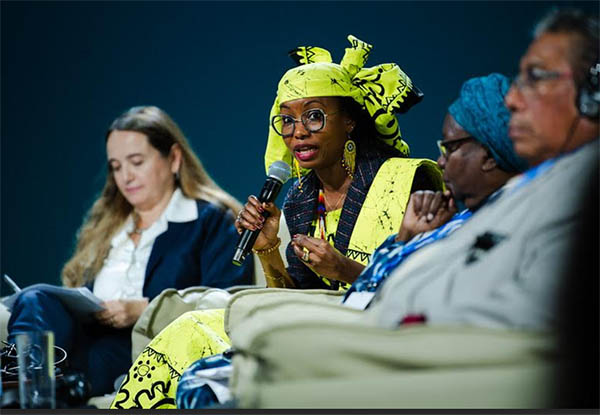
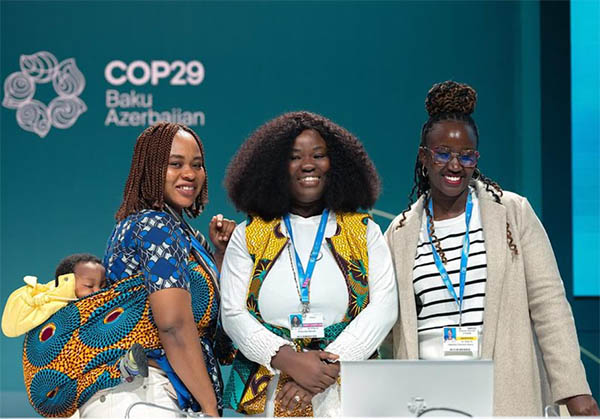
Meanwhile, noticing that rich countries were slow to rise to the occasion in Baku, a new leadership group emerged, and African nations and others from the Least Developed Countries (LDCs) and Small Islands Developing States (SIDS) led the charge.
Kenya and Sierra Leone, in particular, were the leading lights, working with others like Colombia to push for a better deal from Baku. Kenya’s climate envoy, Mohamed Ali, who also chairs the African Group of Negotiators, and Sierra Leone’s Minister of Environment, Jiwoh Abdulai, pressured the COP presidency to deliver a better deal.
“We must have inclusive approaches so that no parties are left behind. As the African Group, we are prepared to reach an agreement here in Baku, and indeed, we must reach an ambitious agreement in all respects, but we are not prepared to accept things that cross our red lines,” Ali offered as the negotiations dragged on. “LDCs remain committed to the COP process, but the developed world needs to show good faith, leadership and commitment to this process. They have to pay their climate debt, which is in the trillions,” noted Jiwoh.
Rohey John Manjang, Gambia’s minister of environment, called out the rich nations over what she termed a deliberate attempt to delay climate justice and block economic progress for Africa.
“This COP has shown how developed countries want to shirk their climate finance responsibilities to vulnerable countries. It is sad that after months of negotiations, they have waited till the last official day of COP to table a dismal figure, leaving no sufficient time for deliberations amongst parties, and to make it worse, the figure is shockingly too low,” she said.
“COP29 has once again fallen short of what is urgently needed for African communities grappling with the devastating impacts of the climate crisis,” said Landry Ninteretse, the Africa Regional Director at 350.org, a non-profit that describes itself as a movement of ordinary people working to build a world powered by the sun, wind and the people.
“As we look ahead to COP30, the message is clear: Africa demands a systemic overhaul of global climate finance – just, fair, urgent, and responding to the scale of appropriate adaptation and mitigation needs for our communities,” he said.
“Rich nations must stop the delays and deliver the financing that African communities deserve. The solutions are here, and the renewable energy revolution is underway—driven by people, for the people. The world must follow their lead.”
The conclusion of COP29 comes at the end of a record-breaking year for climate impacts, with rising temperatures, floods, hurricanes, droughts, and wildfires destroying communities and ecosystems worldwide. Every fraction of a degree matters, and the world cannot delay action on climate any longer if it’s to keep the hope of limiting the global temperature increase to 1.5°C alive.
 The Independent Uganda: You get the Truth we Pay the Price
The Independent Uganda: You get the Truth we Pay the Price

